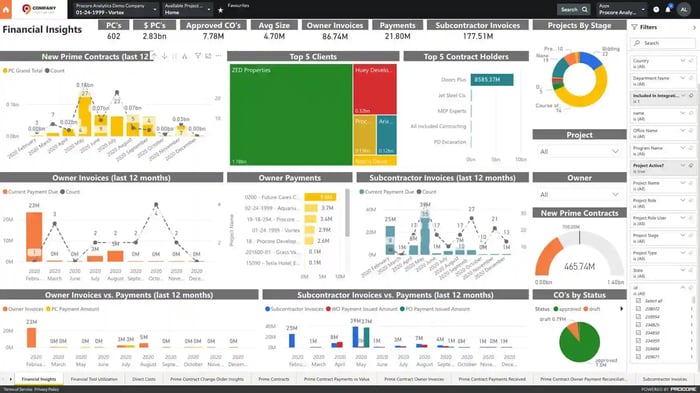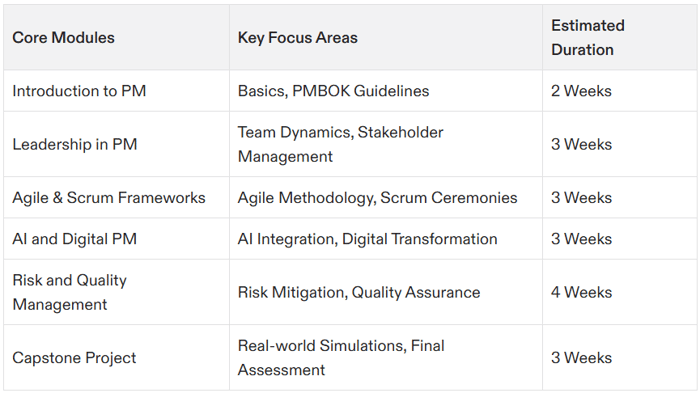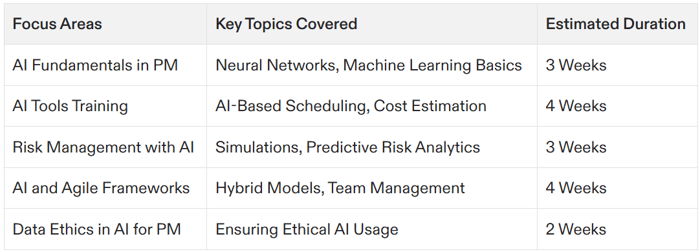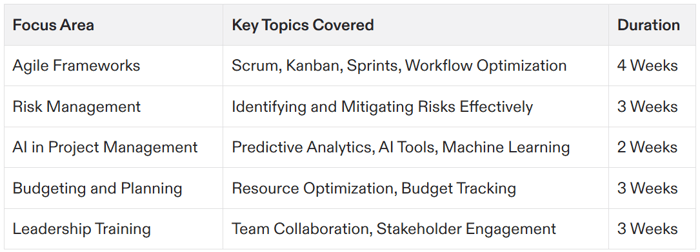Table of Contents
- What is Procore Project Management Certification?
- Why Procore Certification is a Game-Changer
- Procore Certification Levels Explained
- How to Get Certified in Procore Project Management
- The Evolution of Procore Certification: Why It’s More Relevant in 2025
- Procore vs Competitors: What Sets It Apart?
- How Procore Certification Impacts Your Career Growth
- Procore Certification for Different Roles: A Tailored Learning Experience
- The Role of Technology in Construction: How Procore Leads the Way
- Common Mistakes to Avoid When Using Procore
- 10 Facts About Procore You Didn’t Know
- Why Choose APMIC for Your Certification Journey?
- Final Thoughts
- FAQs
Picture this: You’re the superhero of construction projects, armed with cutting-edge tools, managing chaos like a pro, and delivering results that leave everyone in awe. Sounds amazing, right? Well, the Procore Project Management Certification is your cape! Whether you’re a seasoned project manager or just getting started, this certification is the ultimate game-changer. Let’s dive into why this is the must-have credential for 2025 and beyond.
What is Procore Project Management Certification?
The Procore Project Management Certification is a professional training program designed to help construction professionals master Procore, the industry’s leading construction management software. This certification equips you with the technical know-how to streamline project planning, resource allocation, document control, and team collaboration—all on a centralized platform.
Procore isn’t just software; it’s a revolution in how construction projects are managed. With this certification, you’ll be ready to tackle everything from small residential builds to massive commercial projects.
Why Procore Certification is a Game-Changer
Managing construction projects is no walk in the park. With tight deadlines, complex workflows, and high stakes, you need more than just experience—you need expertise. Here’s why Procore Project Management Certification is your golden ticket:
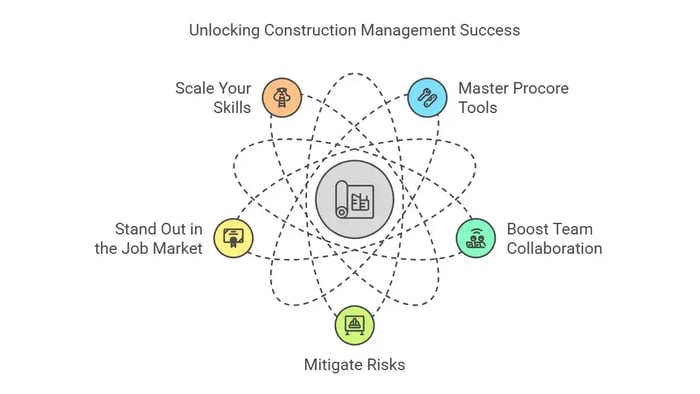
1. Master Procore Tools Like a Pro
Learn to leverage Procore’s integrated features for seamless workflows, real-time updates, and efficient task tracking.
2. Boost Team Collaboration
Facilitate flawless communication between contractors, architects, vendors, and stakeholders using Procore’s collaboration tools.
3. Mitigate Risks Like a Boss
Identify potential issues early and resolve them before they snowball into costly delays.
4. Stand Out in the Job Market
Certified professionals are highly sought after for their credibility and specialized skills in using Procore.
5. Scale Your Skills Across Projects
From small-scale renovations to multi-million-dollar developments, your Procore expertise will scale effortlessly.
Procore Certification Levels Explained
Procore offers a variety of certification pathways tailored to specific roles in the construction industry. These certifications are designed to provide professionals with the skills needed to effectively use Procore’s tools in their respective roles. Here’s a detailed breakdown of the certifications available in 2025:
1. Project Manager Certification
This certification focuses on equipping project managers with tools to oversee all aspects of construction projects, including:
Core Tools: Learn to manage RFIs, submittals, drawings, specifications, and correspondence.
Project Management Tools: Master scheduling, meeting management, punch lists, and daily logs.
Preconstruction Tools: Gain expertise in creating bid packages and managing bid submissions.
This certification is ideal for general contractors, specialty contractors, and project owners seeking to streamline project workflows. Consider that a project manager can also secure a higher-paying job.
2. Superintendent Certification
Superintendents play a critical role in on-site management. This certification focuses on:
Daily log entries for tracking progress.
Inspection features for quality control.
Field data capture using mobile tools.
Safety management for maintaining compliance.
Superintendents certified in Procore are better equipped to manage field operations efficiently.
3. Financials Certification
This certification is tailored for professionals managing project budgets and financial workflows. Key areas include:
Budget creation and forecasting.
Managing prime contracts, subcontracts, and purchase orders.
Handling change orders and financial markups.
It’s perfect for financial controllers or project managers overseeing cost management.
4. Quality & Safety Certification
This certification ensures that construction professionals can maintain high safety standards and deliver quality projects. It covers:
Creating action plans and observations.
Performing inspections using mobile tools.
Managing safety compliance documentation.
Certified professionals are well-prepared to mitigate risks and ensure project success.
5. Admin Certification
Designed for administrators responsible for configuring Procore at the company or project level, this certification includes:
Permission templates for user roles.
System settings configuration.
Managing company-level data.
Admins certified in Procore ensure the seamless implementation of the platform across teams.
6. Student Certification
Aimed at students entering the construction industry, this certification provides foundational knowledge of Procore’s tools, including:
Navigate Procore’s interface (desktop and mobile).
Uploading documents and drawings.
Creating RFIs and submittals.
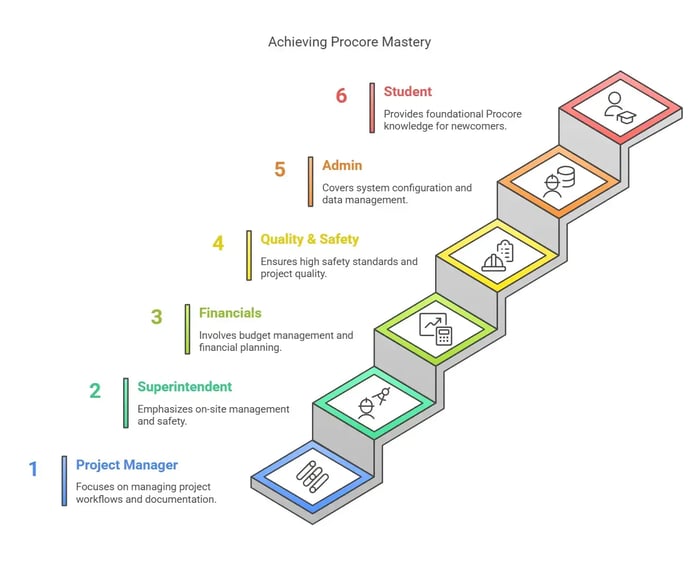
This program prepares students for real-world applications of Procore. For individuals seeking an entry-level certification, a student certification is an excellent start.
Each certification is self-paced, includes interactive exercises, and culminates in a final exam that validates your expertise with a verifiable certificate.
How to Get Certified in Procore Project Management
Getting certified in Procore is a straightforward process that combines flexibility with comprehensive learning. Here’s how you can earn your certification:
Step 1: Sign Up for a Free Account
Start by creating a free Procore account. This gives you access to training resources and allows you to explore the platform’s features before diving into the coursework.
Step 2: Choose the Right Certification
Procore offers certifications tailored to specific roles like project managers, superintendents, and financial controllers. To select the right course:
- Assess your current role or career goals.
- Identify the tools you use most frequently (e.g., RFIs, budgeting tools).
- Visit Procore's Training & Certification page for guidance on available courses.
Pro Tip: Procore offers certifications tailored to specific roles. To select the right course, assess your current role or career goals. For example, if you're in tech, consider the best IT option.
Step 3: Enroll in Your Course
Once you’ve chosen your course:
- Log in to the Procore Certification portal.
- Enroll in your preferred course—most are free of charge. Courses are self-paced, allowing you to learn on your schedule. Some certifications include both desktop and mobile training components to ensure versatility.
Step 4: Complete the Coursework
Each course is divided into modules covering specific tools and workflows. You’ll encounter:
- Video lessons explaining key concepts.
- Interactive exercises simulating real-world tasks (e.g., uploading drawings or creating RFIs).
- Quizzes after each module to reinforce learning.
For example, the “Project Manager: Project Management” course teaches you how to manage submittals, schedules, and correspondence effectively.
Step 5: Pass the Final Exam
After completing all modules, take the final exam. The passing score varies by course but typically requires a solid understanding of all covered topics. Don’t worry if you don’t pass on your first attempt—you can retake it after additional preparation.
Step 6: Earn Your Certificate
Upon passing the exam:
- Receive a verifiable certificate that can be added to LinkedIn or included on your resume.
- Join Procore's Certified User Group on LinkedIn for networking opportunities with over 95,000 professionals worldwide.
Step 7: Continue Learning
To stay ahead in your career:
- Enroll in advanced courses that dive deeper into specific tools or workflows.
- Stay updated with new features through continuing education programs offered by platforms like APMIC.
The Evolution of Procore Certification: Why It’s More Relevant in 2025
Over the years, Procore has transformed from a simple project management tool into a comprehensive platform that addresses the complexities of modern construction. In 2025, Procore Certification remains at the forefront of this evolution, offering role-specific training that adapts to the ever-changing demands of the industry.
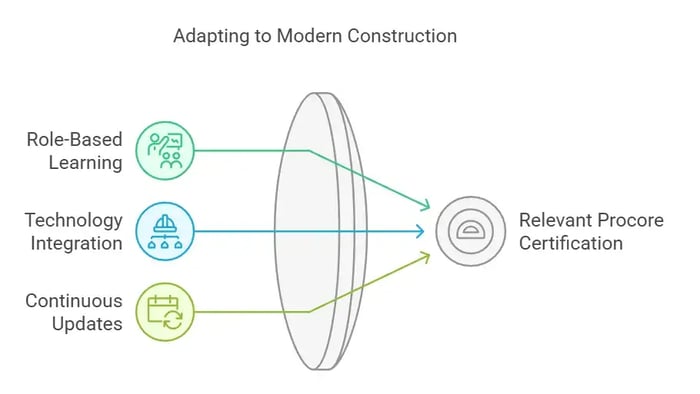
Role-Based Learning: Unlike the deprecated "Procore Fundamentals" course, today’s certifications are tailored for specific roles, such as project managers, superintendents, and subcontractors. This ensures that users gain relevant skills directly applicable to their responsibilities.
Technology Integration: With advancements in AI, IoT, and mobile technology, Procore now trains users to leverage these tools effectively. For instance, its mobile app allows field teams to collaborate in real time, ensuring seamless communication.
Continuous Updates: Procore certifications now include updates on cutting-edge features like drone integrations and sustainability tracking, ensuring professionals remain ahead of industry trends.
In short, Procore Certification in 2025 is not just a credential but a necessity for construction professionals aiming to thrive in a competitive landscape.
Procore vs Competitors: What Sets It Apart?
When it comes to construction management software, Procore stands out from competitors like Buildertrend and CoConstruct due to its unique features:
How Procore Certification Impacts Your Career Growth
Earning a Procore Certification can be a career-defining move. Here’s how it propels your professional journey:
Enhanced Credibility: Certified professionals are seen as experts in using one of the most trusted platforms in construction management.
Higher Earning Potential: Many companies prioritize certified candidates for leadership roles, often offering higher salaries.
Global Opportunities: With Procore’s global recognition, certified professionals can work on projects across borders.
Adaptability Across Roles: Whether you’re a project manager or a subcontractor, certification equips you with skills that are transferable across roles and industries.
Leadership Skills: Beyond technical expertise, certifications emphasize best practices that help you lead teams effectively.
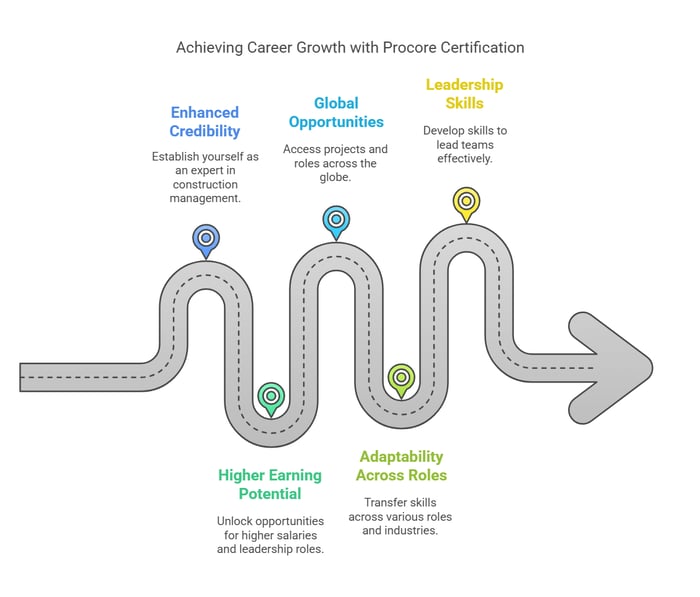
Procore Certification for Different Roles: A Tailored Learning Experience
Procore’s role-specific certifications ensure that every professional gets training relevant to their job:
Project Manager Certification: Focuses on budget allocation, resource management, and workflow optimization.
Superintendent Certification: This covers safety protocols, field progress tracking, and daily logs.
Subcontractor Certification: Teaches RFIs (Requests for Information), submittals, and collaboration best practices.
Estimator Certification: Specializes in cost estimation tools and bid proposals.
Field Worker Training: Optimized for on-site workers using mobile tools to track tasks and progress efficiently.
This tailored approach ensures maximum relevance and applicability for every user.
The Role of Technology in Construction: How Procore Leads the Way
The construction industry is undergoing a technological revolution, and Procore is at its helm:
AI Integration: Predictive analytics help teams anticipate risks and optimize workflows.
IoT Compatibility: Devices connected through IoT feed real-time data into Procore dashboards.
Drone Monitoring: Upload drone footage directly into Procore to monitor site progress remotely.
Sustainability Tracking: Features designed for LEED-certified projects make sustainable construction more manageable.
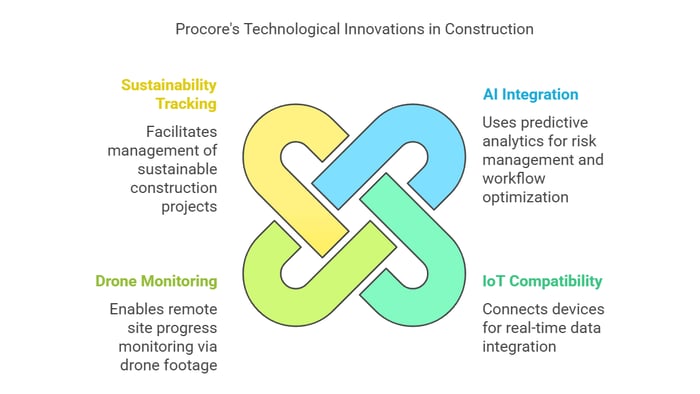
These innovations make Procore an indispensable tool for modern construction management.
Common Mistakes to Avoid When Using Procore
Even with its robust features, improper usage of Procore can lead to inefficiencies:
Underutilizing Features: Many users fail to explore advanced tools like Gantt charts or custom workflows.
Poor Team Training: Without proper certification, team members may struggle with basic tasks.
Ignoring Updates: Staying updated on new features is crucial for maximizing ROI.
Inconsistent Documentation: Not using centralized document storage can lead to miscommunication.
Procore certification ensures that users avoid these pitfalls by providing comprehensive training.
10 Facts About Procore You Didn’t Know
Seamless Integration: Procore integrates effortlessly with tools like QuickBooks and Bluebeam, enabling smooth workflows and data sharing across platforms.
Multilingual Support: It supports over 30 languages, making it a global solution for diverse project teams (Procore).
AI-Driven Insights: Procore leverages artificial intelligence to provide predictive analytics, helping teams foresee potential risks and optimize performance.
Mobile Optimization: The Procore mobile app is specifically designed for fieldwork, ensuring that teams can collaborate effectively even on-site.
Pre-Built Compliance Templates: Procore includes customizable templates for compliance documentation, saving time and ensuring accuracy (constructionexec.com).
Scalability for Large Projects: The platform has been successfully used for projects worth billions of dollars, showcasing its scalability and reliability (Procore).
Unlimited Cloud Storage: Procore offers unlimited storage for project files, ensuring that teams never run out of space for critical documents (source).
Custom API Integrations: Its robust API allows businesses to create custom integrations tailored to their unique needs, enhancing functionality.
Drone Footage Uploads: Procore supports drone footage uploads, allowing teams to monitor project sites remotely and in real time.
LEED-Certified Projects: The platform includes features specifically tailored for managing LEED-certified construction projects, promoting sustainability.
Why Choose APMIC for Your Certification Journey?
If you’re serious about becoming a certified expert in project management, APMIC offers unparalleled training resources. With over 400 specialized modules designed by industry veterans, APMIC ensures you gain not just certification but mastery of project management skills tailored for real-world applications.
Final Thoughts
The Procore Project Management Certification isn’t just another credential—it’s your gateway to becoming a leader in construction project management. With its robust tools and global recognition, this certification empowers you to deliver projects on time, within budget, and beyond expectations. Ready to transform your career? Start your journey today with APMIC, where excellence meets opportunity!
FAQs
Is Procore certification worth it?
Absolutely! It enhances your skills, boosts your career prospects, and equips you with tools to manage projects efficiently.
How long does it take to complete Procore certification?
Basic certifications take 2–4 weeks, while advanced courses may take up to 8 weeks or more.
Can beginners enroll in Procore certification?
Yes! The program caters to all levels—from novices to seasoned professionals.
Is Procore certification free?
Many foundational courses are free on Procore’s platform, but advanced modules may have fees through third-party providers like APMIC.
What industries use Procore?
While primarily used in construction, industries like real estate development and infrastructure also rely on Procore.
Can I add my certification to LinkedIn?
Yes! You’ll receive a verifiable certificate that can be showcased on LinkedIn or other professional platforms.
Does Procore offer role-specific certifications?
Yes! Certifications are tailored for roles such as project managers, superintendents, and estimators.
How often should I renew my certification?
While there’s no expiration date for most certifications, staying updated with new features is highly recommended.

